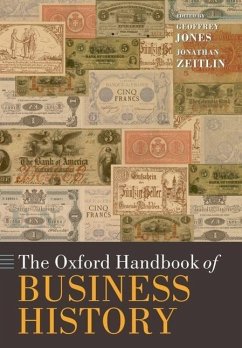Geoffrey Jones (Harvar Isidor Straus Professor of Business History, Jonathan Zeitlin (Professor of Public Policy and Univer Governance
The Oxford Handbook of Business History
Ed. by Jones, Geoffrey and Zeitlin, Jonathan
Geoffrey Jones (Harvar Isidor Straus Professor of Business History, Jonathan Zeitlin (Professor of Public Policy and Univer Governance
The Oxford Handbook of Business History
Ed. by Jones, Geoffrey and Zeitlin, Jonathan
- Broschiertes Buch
- Merkliste
- Auf die Merkliste
- Bewerten Bewerten
- Teilen
- Produkt teilen
- Produkterinnerung
- Produkterinnerung
Readership: Academics, researchers, and graduate students studying Business and Economic History
This Handbook shows that Business History is a wide-ranging and dynamic area of study, producing compelling empirical data, which has sometimes confirmed and sometimes contested widely-held views in management and the social sciences. A key reference work for scholars of Business History, and a fascinating resource for social scientists in general.
Andere Kunden interessierten sich auch für
![The Oxford Handbook of International Business Strategy The Oxford Handbook of International Business Strategy]() The Oxford Handbook of International Business Strategy219,99 €
The Oxford Handbook of International Business Strategy219,99 €![The Oxford Handbook of Project Management The Oxford Handbook of Project Management]() Peter W. G. MorrisThe Oxford Handbook of Project Management68,99 €
Peter W. G. MorrisThe Oxford Handbook of Project Management68,99 €![The Oxford Handbook of Latin American History The Oxford Handbook of Latin American History]() The Oxford Handbook of Latin American History64,99 €
The Oxford Handbook of Latin American History64,99 €![The Oxford Handbook of Strategy The Oxford Handbook of Strategy]() David O. Faulkner / Andrew Campbell (eds.)The Oxford Handbook of Strategy93,99 €
David O. Faulkner / Andrew Campbell (eds.)The Oxford Handbook of Strategy93,99 €![The Oxford Handbook of Early Modern European History, 1350-1750 The Oxford Handbook of Early Modern European History, 1350-1750]() The Oxford Handbook of Early Modern European History, 1350-175057,99 €
The Oxford Handbook of Early Modern European History, 1350-175057,99 €![The Oxford Handbook of Talent Management The Oxford Handbook of Talent Management]() The Oxford Handbook of Talent Management63,99 €
The Oxford Handbook of Talent Management63,99 €![The Oxford Handbook of Regulation The Oxford Handbook of Regulation]() Robert BaldwinThe Oxford Handbook of Regulation68,99 €
Robert BaldwinThe Oxford Handbook of Regulation68,99 €-
-
-
Readership: Academics, researchers, and graduate students studying Business and Economic History
This Handbook shows that Business History is a wide-ranging and dynamic area of study, producing compelling empirical data, which has sometimes confirmed and sometimes contested widely-held views in management and the social sciences. A key reference work for scholars of Business History, and a fascinating resource for social scientists in general.
Hinweis: Dieser Artikel kann nur an eine deutsche Lieferadresse ausgeliefert werden.
This Handbook shows that Business History is a wide-ranging and dynamic area of study, producing compelling empirical data, which has sometimes confirmed and sometimes contested widely-held views in management and the social sciences. A key reference work for scholars of Business History, and a fascinating resource for social scientists in general.
Hinweis: Dieser Artikel kann nur an eine deutsche Lieferadresse ausgeliefert werden.
Produktdetails
- Produktdetails
- Oxford Handbooks
- Verlag: Oxford University Press
- Seitenzahl: 736
- Erscheinungstermin: 24. September 2009
- Englisch
- Abmessung: 247mm x 172mm x 45mm
- Gewicht: 1284g
- ISBN-13: 9780199573950
- ISBN-10: 0199573956
- Artikelnr.: 26579955
- Herstellerkennzeichnung
- Libri GmbH
- Europaallee 1
- 36244 Bad Hersfeld
- gpsr@libri.de
- Oxford Handbooks
- Verlag: Oxford University Press
- Seitenzahl: 736
- Erscheinungstermin: 24. September 2009
- Englisch
- Abmessung: 247mm x 172mm x 45mm
- Gewicht: 1284g
- ISBN-13: 9780199573950
- ISBN-10: 0199573956
- Artikelnr.: 26579955
- Herstellerkennzeichnung
- Libri GmbH
- Europaallee 1
- 36244 Bad Hersfeld
- gpsr@libri.de
Geoffrey Jones is Isidor Straus Professor of Business History, Harvard Business School. He previously taught at the universities of Cambridge and Reading, and at the London School of Economics and Political Science, in Great Britain. He is the author and editor of many books and articles on the history of international business, including British Multinational Banking 1830-1990 (OUP, 1993), Merchants to Multinationals (OUP, 2000), Multinationals and Global Capitalism (OUP, 2005) and Renewing Unilever (OUP, 2005). He is a former President of both the European Business History Association and the Business History Conference of the Untied States, is co-editor of the journal Business History Review. Jonathan Zeitlin is Professor of Public Policy and Governance at the University of Amsterdam. He is also Director of the Center for World Affairs and the Global Economy (WAGE), and Founding Director of the European Union Center of Excellence. He was previously Lecturer in Social and Economic History at Birkbeck College, London, and Research Fellow at King's College, Cambridge, in Great Britain. He is the author and editor of numerous books and articles on the comparative and historical analysis of business organization, employment relations, and socio-economic governance, most recently Local Players in Global Games: The Strategic Constitution of a Multinational Corporation (OUP, 2005). He is co-editor of the journal Socio-Economic Review, a member of the editorial board of Enterprise & Society, and a former Trustee of the Business History Conference.
* Part I: Approaches and Debates
* 1: Geoffrey Jones and Jonathan Zeitlin: Introduction
* 2: Patrick Fridenson: Business History and History
* 3: Naomi Lamoreaux, Daniel Raff, and Peter Temin: Economic Theory and
Business History
* 4: William Lazonick: Business History and Economic Development
* 5: Matthias Kipping and Behlül Üsdiken: Business History and
Management Studies
* 6: Jonathan Zeitlin: The Historical Alternatives Approach
* 7: Geoffrey Jones: Globalization
* Part II: Forms of Business Organization
* 8: Youssef Cassis: Big Business
* 9: Andrea Colli and Mary Rose: Family Business
* 10: Jonathan Zeitlin: Industrial Districts and Regional Clusters
* 11: W. Mark Fruin: Business Groups and Interfirm Networks
* 12: Jeffrey Fear: Cartels
* 13: Luca Lanzalaco: Business Interest Associations
* Part III: Functions of Enterprise
* 14: Michel Lescure: Banking and Finance
* 15: Margaret B.W. Graham: Technology and Innovation
* 16: Wolfgang König: Design and Engineering
* 17: Robert Fitzgerald: Marketing and Distribution
* 18: Howard Gospel: The Management of Labor and Human Resources
* 19: Trevor Boyns: Accounting, Information, and Communication Systems
* 20: Gary Herrigel: Corporate Governance
* Part IV: Enterprise and Society
* 21: Geoffrey Jones and R. Daniel Wadhwani: Entrepreneurship
* 22: Robert Millward: Business and the State
* 23: Kathleen Thelen: Skill Formation and Training
* 24: Rolv Petter Amdam: Business Education
* 25: Kenneth Lipartito: Business Culture
* 1: Geoffrey Jones and Jonathan Zeitlin: Introduction
* 2: Patrick Fridenson: Business History and History
* 3: Naomi Lamoreaux, Daniel Raff, and Peter Temin: Economic Theory and
Business History
* 4: William Lazonick: Business History and Economic Development
* 5: Matthias Kipping and Behlül Üsdiken: Business History and
Management Studies
* 6: Jonathan Zeitlin: The Historical Alternatives Approach
* 7: Geoffrey Jones: Globalization
* Part II: Forms of Business Organization
* 8: Youssef Cassis: Big Business
* 9: Andrea Colli and Mary Rose: Family Business
* 10: Jonathan Zeitlin: Industrial Districts and Regional Clusters
* 11: W. Mark Fruin: Business Groups and Interfirm Networks
* 12: Jeffrey Fear: Cartels
* 13: Luca Lanzalaco: Business Interest Associations
* Part III: Functions of Enterprise
* 14: Michel Lescure: Banking and Finance
* 15: Margaret B.W. Graham: Technology and Innovation
* 16: Wolfgang König: Design and Engineering
* 17: Robert Fitzgerald: Marketing and Distribution
* 18: Howard Gospel: The Management of Labor and Human Resources
* 19: Trevor Boyns: Accounting, Information, and Communication Systems
* 20: Gary Herrigel: Corporate Governance
* Part IV: Enterprise and Society
* 21: Geoffrey Jones and R. Daniel Wadhwani: Entrepreneurship
* 22: Robert Millward: Business and the State
* 23: Kathleen Thelen: Skill Formation and Training
* 24: Rolv Petter Amdam: Business Education
* 25: Kenneth Lipartito: Business Culture
* Part I: Approaches and Debates
* 1: Geoffrey Jones and Jonathan Zeitlin: Introduction
* 2: Patrick Fridenson: Business History and History
* 3: Naomi Lamoreaux, Daniel Raff, and Peter Temin: Economic Theory and
Business History
* 4: William Lazonick: Business History and Economic Development
* 5: Matthias Kipping and Behlül Üsdiken: Business History and
Management Studies
* 6: Jonathan Zeitlin: The Historical Alternatives Approach
* 7: Geoffrey Jones: Globalization
* Part II: Forms of Business Organization
* 8: Youssef Cassis: Big Business
* 9: Andrea Colli and Mary Rose: Family Business
* 10: Jonathan Zeitlin: Industrial Districts and Regional Clusters
* 11: W. Mark Fruin: Business Groups and Interfirm Networks
* 12: Jeffrey Fear: Cartels
* 13: Luca Lanzalaco: Business Interest Associations
* Part III: Functions of Enterprise
* 14: Michel Lescure: Banking and Finance
* 15: Margaret B.W. Graham: Technology and Innovation
* 16: Wolfgang König: Design and Engineering
* 17: Robert Fitzgerald: Marketing and Distribution
* 18: Howard Gospel: The Management of Labor and Human Resources
* 19: Trevor Boyns: Accounting, Information, and Communication Systems
* 20: Gary Herrigel: Corporate Governance
* Part IV: Enterprise and Society
* 21: Geoffrey Jones and R. Daniel Wadhwani: Entrepreneurship
* 22: Robert Millward: Business and the State
* 23: Kathleen Thelen: Skill Formation and Training
* 24: Rolv Petter Amdam: Business Education
* 25: Kenneth Lipartito: Business Culture
* 1: Geoffrey Jones and Jonathan Zeitlin: Introduction
* 2: Patrick Fridenson: Business History and History
* 3: Naomi Lamoreaux, Daniel Raff, and Peter Temin: Economic Theory and
Business History
* 4: William Lazonick: Business History and Economic Development
* 5: Matthias Kipping and Behlül Üsdiken: Business History and
Management Studies
* 6: Jonathan Zeitlin: The Historical Alternatives Approach
* 7: Geoffrey Jones: Globalization
* Part II: Forms of Business Organization
* 8: Youssef Cassis: Big Business
* 9: Andrea Colli and Mary Rose: Family Business
* 10: Jonathan Zeitlin: Industrial Districts and Regional Clusters
* 11: W. Mark Fruin: Business Groups and Interfirm Networks
* 12: Jeffrey Fear: Cartels
* 13: Luca Lanzalaco: Business Interest Associations
* Part III: Functions of Enterprise
* 14: Michel Lescure: Banking and Finance
* 15: Margaret B.W. Graham: Technology and Innovation
* 16: Wolfgang König: Design and Engineering
* 17: Robert Fitzgerald: Marketing and Distribution
* 18: Howard Gospel: The Management of Labor and Human Resources
* 19: Trevor Boyns: Accounting, Information, and Communication Systems
* 20: Gary Herrigel: Corporate Governance
* Part IV: Enterprise and Society
* 21: Geoffrey Jones and R. Daniel Wadhwani: Entrepreneurship
* 22: Robert Millward: Business and the State
* 23: Kathleen Thelen: Skill Formation and Training
* 24: Rolv Petter Amdam: Business Education
* 25: Kenneth Lipartito: Business Culture








